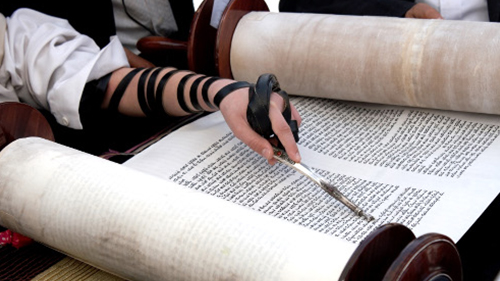Rabbi James Greene, Addison-Penzak Jewish Community Center of Silicon Valley in Los Gatos, CA In this week’s portion, Terumah, God instructs the Israelite community on how to build the tabernacle, the sanctuary used in the wilderness. Like all good faith communities, if you want to build the building you have to raise the dough. So […]
by Rabbi Miri Gold , Kehilat Birkat Shalom , a regional congregation located at Kibbutz Gezer, Israel We are mourning one of the great rabbis and scholars of our time, Rabbi Gunther Plaut z”l , who conceived and edited The Torah: A Modern Commentary . This volume graces the pews of many of our WUPJ […]
By Rabbi Fred Morgan, Senior Rabbi, Temple Beth Israel , Melbourne, Australia The portion Terumah begins a narrative about the construction of the mishkan , the sanctuary that accompanies the Jewish people in their wanderings through the wilderness, that takes up five weekly readings from the Torah. It is the longest continuous narrative in the […]
The instruction Ray receives is strangely reminiscent of the one in this week’s Torah portion when God tells Moses: וְעָשׂוּ לִי מִקְדָּשׁ וְשָֽׁכַנְתִּי בְּתוֹכָֽם ( veasu li mikdash veshochanti betocham ) – Make for me a Mikdash (a Tabernacle) and I will dwell amongst you (Exodus 25:8). The instructions are relatively clear, especially as the […]
Recent Issues By: Rabbi Melanie Aron, Congregation Shir Hadash , Los Gatos, California, USA Responding to the Stranger Who is in Our Midst Lemah hadavar domeh – To what is this similar? That is the question I remember best from when I was a young student learning the Talmud. It’s a helpful way of looking […]
Recent Issues By: Rabbi Naamah Kelman, the Dean of Hebrew Union College-Jewish Institute of Religion in Jerusalem Recently I participated on a panel discussing Intermarriage. This was for an Israeli audience and for many of them; the very issue of Intermarriage is just another indication of the decline of Jewry outside of Israel. It was […]
In the Mechilta, an early collection of Midrash on the Book of Exodus, we are taught that this law to return your enemy’s livestock is connected to the precepts of justice found earlier in the Parasha. We Jews, this Midrash teaches, must not treat others in an injurious, unethical or immoral fashion just because they have treated us in such a manner. The Mechilta reminds us that our enemies do not cease to be human beings just because they act immorally or inhumanely toward us. For the sake of our own humanity –not theirs – we must act justly toward our enemies.
By Rabbi Josh Jacobs-Velde, Ohev Tzedek-Shaarei Torah , Ohio, USA The Jewish-American poet Marge Piercy has written an achingly beautiful poem called “Nishmat,” which appears in the Reconstructionist Kol Haneshamah siddur as an interpretation of the traditional Nishmat Kol Chai prayer of Shabbat morning. Here is an excerpt: “…Every day we find a new sky […]
by Rabbi Samuel M. Cohon, Senior Rabbi, Temple Emanu-El of Tucson, Arizona, USA, and host, “The Too Jewish Radio Show with Rabbi Sam Cohon and Friends” The great 60’s comedian, Alan Sherman wrote a book about restrictions on human behavior. He decided to invent a new religion, which would have only one commandment: “Thou shalt […]
by Rabbi Burt Schuman, Beit Warszawa , Warsaw, Poland One of the ongoing challenges we face within our world Jewish community in general, and in the Progressive Jewish community in particular, is that of finding the right balance between lay and rabbinic leadership. On one hand I, and many of my colleagues, must contend what are […]

